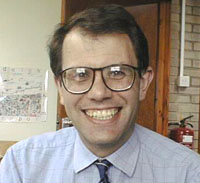Membership List | Publications | Research | Profiles | Braided Learning Ejournal
David Baugh
Fellow

So what were the judges looking for? Both awards had similar objectives on paper by looking for teachers who were by their use of ICT able to have a real impact on their pupils, peers and the wider community. In reality, I think the two organisations had different agendas with the Teaching Awards looking for teachers who were a little bit different and with BECTa looking for replicable good practice. Neither of these are a perfect way of choosing winners but I suppose the judges had to make some tough decisions.
How then did I fit the bill? I think was in part due to my passion for ICT transform education and my eternal optimism. With all the cynicism and suspicion of change there is in the profession a bit of optimism goes a long way. I work in the worst funded LEA in Wales which lags some 5% behind the funding in England. We receive one quarter of the NGfL funding that a comparable LEA would across the border. My solution to this was to scrounge and enlist the parents in networking of the school. We ended up with 32 networked computers for nothing. The real challenge should have been how to get everyone using the computers productively but it wasn’t. Quite early on in my teaching career I discovered the power of multimedia as a tool for the children to use to express themselves and it was this that the staff took up with great zeal. I have become disaffected with children using ICT passively with so called interactive multimedia programmes and with teachers endlessly using ICT to test children. So I have concentrated on using ICT to be creative and tried to encourage children to be investigative and analytical.
These are easy words to write but how can it happen in practice. An example of ICT transforming teaching arose by accident really. We were investigating air resistance by dropping different types of parachutes and trying to time their fall to the ground – you know the type of thing. The children were having the usual problems with accuracy using stopwatches. I asked some of the children to make a record of the investigation by filming the investigation with a DV Camera. They started to make the film and then showed me how they could time the parachutes on the computer by cutting the video in the right places. They could also make more accurate observation with the video by seeing exactly how the parachutes fell and put this together to present their results. To me this was real independent investigation that wasn’t possible without ICT and transformed the way we worked in the classroom. Other projects we have done using video and multimedia are similar in the way they can liberate learning from some of the rather stilted paper based projects I have devised in the past.
The judges spent about three days in my classroom, which was not as daunting as it may sound as they were put to work! The children were engaged on the type of projects explained above doing all types of subjects and importantly being productive. This meant my classroom was as chaotic as ever but something seemed to click with the judges – they enjoyed it too.
I hope you find this useful and gives you some sort of insight into the awards from a winners perspective.
[Back]

